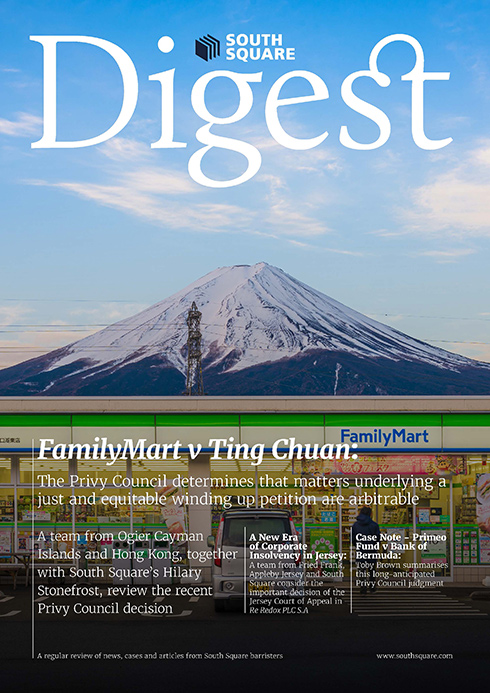

Rocco Cecere (Partner, Collas Crill) and Edoardo Lupi consider the most recent developments in light of Trina Solar and Nord Anglia
Click here to read the full article.
Introduction
Pursuant to section 238 of the Cayman Companies Act, upon a merger or consolidation, a dissenting shareholder is entitled to a determination by the Grand Court of the “fair value” of its shares, along with a fair rate of interest. A long-form merger or consolidation under Part XVI of the Companies Act is authorised by a two-thirds majority in voting power of the company’s members1. Upon giving notice of dissent, all of the dissenting shareholder’s rights are replaced by an entitlement “to be paid the fair value of that person’s shares”2.
Section 238 has given rise to a large number of petitions in recent years, most of them involving Cayman Islands companies listed on United States stock exchanges with substantial business operations in the People’s Republic of China. In the majority of cases, the merger is initiated by the company’s founder as a mechanism to take the company private by acquiring the shares of minority shareholders.
To date, comparatively few Section 238 petitions have gone to trial3. In light of international developments4, COVID-related market disruptions which depressed share prices and, more recently, confirmation of a dissenter’s entitlement to a fair value determination irrespective of the form of merger (see further below), the number of Section 238 petitions has continued to increase.
Section 238 is a comparatively recent addition to the Companies Act. Since its introduction, the Grand Court has sought to grapple with what “fair value” means in this context and which valuation methodology, or combination of methodologies, it can rely on when determining fair value. In the recently decided cases, the battle lines between dissenting shareholders and petitioning companies5 have followed a similar pattern. On the company-side, the tendency has been to rely on certain market indicators as proxies for fair value, namely:
(a) The adjusted share price (i.e., the price at which the company’s shares would have been bought and sold on the relevant exchange as at the valuation date, in the absence of any proposed merger); and/or
(b) The merger price of the transaction which the dissenters have dissented from. On the dissenter-side, reliance has more frequently been placed on a discounted cash flow analysis (“DCF”) with a view to establishing the intrinsic value of the dissenters’ shares. From a commercial perspective, market-based approaches almost invariably produce a fair value determination equal to or only marginally better than the merger price.
As a result, the expert valuation evidence being adduced in Section 238 proceedings is increasingly sophisticated (and voluminous), addressing a broad spectrum of issues. These include:
(a) as regards the adjusted share price, the ‘efficiency’ of the market for the company’s shares, as well as the existence or not of ‘material non-public information’ (or ‘MNPI’);
(b) As regards the merger price, the robustness of the deal process which led to the transaction, the conduct of the special committee appointed to negotiate the transaction on the seller-side, and any structural factors which may have prevented or inhibited competing bids from emerging; and
(c) As regards the DCF, evidence goes to the different components making up the valuation model including the reliability of the company’s projections and forecasts. Further, in a recent case, the parties were given permission to adduce expert evidence from ‘industry experts’, as well as experts of Delaware law, in circumstances where Delaware’s appraisal regime served as one of the models for Section 238 when it was enacted (see further below).
This article considers the most recent developments in this space, particularly the first instance judgments in Re Trina Solar Limited (“Trina”) and Re Nord Anglia Inc. (“Nord”) which has shed further light on the Grand Court’s approach to determining “fair value” in the Section 238 context. From a procedural standpoint, there have also been some significant clarifications on the ambit of dissenter discovery, as well as confirmation of dissenters’ entitlement to a fair value determination in the context of a short- form merger. These developments are also considered below.
The Delaware connection
Section 238 was enacted as recently as May 2009. In contrast, statutory merger regimes have been long-standing fixtures of the corporate codes of certain US states and Canada, with Delaware appraisal jurisprudence, in particular, being recognised as “well-developed”6. Delaware authorities have frequently been cited to the Grand Court in Section 238 cases. In Trina, the parties adduced expert evidence as to Delaware law, having been invited by the Judge to do so if they were intending to rely on Delaware law at trial.
In Shanda Games Ltd v Maso Capital Investments Ltd [2020] UKPC 2 (“Shanda PC”)7, Lady Arden pointed to Delaware jurisprudence as being “of great value in this field” – but cautioned against importing Delaware law concepts without due regard to “different economic and social policy considerations affecting legislation in Delaware”. Notably, on a number of matters, the Cayman Court has ploughed its own furrow and departed from the approach taken in the Delaware authorities. For example:
(1) In Shanda PC, the Privy Council held that the Delaware approach to valuing the shares of a minority (on a pro rata basis, as opposed to by reference to the minority shares themselves) does not apply to Section 238 appraisals.
(2) Minority discounts are not applied in Delaware appraisal actions8 but since the decision in Shanda PC minority discounts may be applied in Section 238 cases, though there is no bright-line rule to that effect and the Cayman Islands Court of Appeal was wrong to hold that there is such a rule9.
(3) In both Trina and Nord (as well as Qunar before them), the Grand Court determined fair value by blending different valuation methodologies. In Trina, Segal J noted that no Delaware cases had been cited to him in which the Delaware Court gave weight both to the merger price and the adjusted share price10.
The significance of market-based approaches
Much of the legal controversy in recent Section 238 cases has concerned the extent to which the Grand Court should have regard to market- based approaches when determining fair value, as opposed to adopting valuation techniques more commonly associated with intrinsic or fundamental value, such as the DCF. In Nord, the dissenters sought to contrast the way in which Section 238 mandates the Grand Court to “determine” fair value as opposed to the price produced among market participants. They found an unlikely mouthpiece in Oscar Wilde’s Lord Darlington to summarise their case on this point11:
“A cynic is a man who knows the price of everything and the value of nothing”.
The Grand Court has repeatedly held that a DCF can be “an accurate measure of fair value” depending, in particular, on the reliability of the management projections12. In all of the Section 238 cases to date, the DCF has featured in the Grand Court’s final assessment of fair value: in Shanda, a DCF was given 100% weight; in Integra, a 75% weighting was applied to a DCF, with 25% given to the guideline public company methodology; in Qunar, 50% weight was given to a DCF and 50% to the adjusted share price; in Nord, a 40% weighting was applied to a DCF approved by the Grand Court, and 60% to the merger price; and in Trina, a 45% weighting was applied to the merger price, 30% to the adjusted share price, and 25% to a DCF.
Following the decision in Shanda PC, however, the company in Trina raised an argument which was intended “to eliminate reliance on or to reduce the weight to be attached to a DCF valuation”13.
PC effectively mandated the Grand Court, in the case of a listed company, only to consider market- based indicators, having exclusive regard to publicly available information14. Segal J rejected this argument. The principle derived from Shanda PC said nothing about the manner in which the fair value of the dissenting shareholder’s shares is to be ascertained, nor did it require the Grand Court to assume a hypothetical sale between a willing buyer and a willing seller15.
The Grand Court has now made clear in a number of cases that a market price cannot simply be equated with fair value within the meaning of Section 238. Indeed, in no decided case has the Grand Court placed exclusive reliance on market- based approaches. The question for the Grand Court as to the valuation methodology it adopts is not subject to bright-line rules, but is a fact- sensitive question to be decided in all of the circumstances16.
‘Blending’
Faced with these often entrenched positions, the Grand Court has in recent cases proceeded to “blend” valuation approaches, applying different weightings to market indicators as well as to a DCF analysis in reaching its final determination of fair value.
In some cases, the Grand Court has taken this course having preferred the valuation evidence of an expert who opined that blending was appropriate in the circumstances17. Thus in Trina, the Judge held that he was satisfied that it was appropriate to adopt the blended approach preferred by the company expert. Segal J gave weight to three competing valuation methodologies, in circumstances where he considered each methodology to be subject to sufficiently serious uncertainty to justify some level of discounting18.
In Nord, neither expert advocated blending and, thus, had not opined on any particular weighting. The company expert believed that 100% weight should be accorded to the adjusted share price
or, alternatively, 100% to the merger price. In contrast, the dissenter expert opined that 100% weight should be accorded to a DCF. Kawaley J held that Section 238 confers jurisdiction to permit“adapting or blending” the approaches proposed by expert valuers19 and proceeded to do so despite finding the weighting exercise “very difficult”.
The interrelationship between blending and the evidential burden on the parties to make good their case on particular issues is not altogether clear from these decisions. The Grand Court
has tended to reflect perceived deficiencies in a particular methodology by discounting the weighting applied to it in the final determination of fair value20. This approach may well raise principled difficulties where, for instance, the Grand Court has determined that the deal process had some limited merits but overall was insufficiently robust and not conducted at arm’s length. This is often an issue in the Cayman Islands cases, where the merger is frequently instigated by the founder of the company, whose buyer group has enough voting power to authorise the merger and has made it clear that it will not work with any other rival bidder (irrespective of their offer) thereby deterring competing bids. In such a case, it is not altogether easy to see why the merger price should be accorded any weight at all: ex hypothesi, there is no rational way to ascertain whether, had the deal process in fact been sufficiently open and robust, a competing bidder or bidders would have made topping bids and, if so, the size of the topping bid(s).
Minority discount
The Shanda PC judgment was handed down after trial in both the Nord and Trina cases, but prior to judgment. Substantial post-trial submissions were received on the Shanda PC decision in Trina but
not in Nord.
In Nord, the Judge noted that the starting assumption was that a minority discount should be applied, but that there needed to be an evidential foundation for the Grand Court to make such a finding. The dissenter expert had opined, without contradiction by the company expert, that no minority discount was required on the facts. That being so, the Judge found himself unable to apply a minority discount based on the evidence before him.
In Trina, Segal J emphasised that the Privy Council had explained that a minority discount could be applied in an appropriate case, but did not rule out the possibility that there might be a case where such a discount was inappropriate. In Trina it was agreed that a minority discount was appropriate, with the experts disagreeing only on the size of that discount. The Judge preferred the dissenters’ figure of 2% as opposed to the company’s figure of 10%. Following judgment, an issue arose as to whether the 2% discount should be applied to the part of the fair value determination referable to the merger price (to which the Judge had applied a 45% weighting), as well as to the DCF. In a further judgment21, Segal J concluded that he should accept the views of the company expert and apply a discount to the merger price component as well, in circumstances where only the company’s evidence had dealt with the point22. However, the Judge made clear that he was not deciding the point for the future, given that it had only appeared in post-trial submissions and was not fully canvassed at trial.
Other developments
As regards the contentious area of dissenter discovery, the Grand Court has clarified matters going to the scope of dissenters’ obligation to give discovery in Section 238 proceedings in a number of recent decisions. In Re eHi Car Services Limited23, the company attempted to extend categories of disclosure to be provided by dissenting shareholders. The Grand Court rejected these categories as disproportionate, as it had done in prior cases. Subsequently, in Re FGL Holdings24 the Grand Court once again rejected an attempt which sought to impose an obligation akin to giving general discovery.
A further significant development concerns the availability of Section 238 relief in respect of
‘short-form’ mergers. Short-form mergers may be effected where a parent entitled to exercise at least 90% of the voting power in a direct subsidiary merges with that subsidiary. In that scenario,
there is no requirement for a shareholder vote to authorise the merger: all that is required is to give a copy of the plan of merger to every member of the subsidiary to be merged.25
In the recent Changyou.com decision26, shareholders dissented from a short-form merger notwithstanding that the company’s public filings stated that dissent rights were not available in that case. Deciding the matter as a preliminary issue on a Section 238 petition, Chief Justice Smellie held that a shareholder in the case of a short-form merger is entitled to a determination of the fair value of its shares. The company had failed to identify any reason why a minority shareholder in a short-form merger was any less deserving of protection against the compulsory acquisition of its shares than a shareholder in a long-form merger. The Changyou.com decision has broad implications. Before it was handed down, there were a number of pending short-form mergers, which did not envisage minority shareholders being entitled to exercise the right to dissent. At least one of those mergers was subsequently revised to comply with the Changyou.com ruling, by offering dissent rights. Further, before the Changyou.com ruling, a number of companies had completed short-form mergers without offering dissent rights27. Minority shareholders have commenced proceedings against some of these companies and their management in the United States alleging breaches of the United States Securities Exchange Act.
Conclusion
Section 238 protects minority shareholders whose shares have been compulsorily acquired. It was described by the Chief Justice in JA Solar Holdings Co., Ltd as a “vital safeguard for minority shareholders designed to protect their economic interests”28 and by Segal J in Shanda as “the mechanism by which the rights of the dissenting minority are protected and such shareholders are given access to the Court (without interference with or delaying the statutory merger process)”29 The safeguarding role Section 238 plays within the scheme of the Companies Act is critical particularly in view of the comparatively low thresholds imposed under Part XVI for the authorisation of long-form and short-form mergers30. The Grand Court has now demonstrated its reluctance to permit petitioning companies from
(a) Circumventing a dissenter’s entitlement to a fair value determination by reliance on the short- form merger procedure and
(b) relying on market prices as a proxy for fair value in all cases as a rule of thumb. Rather, as is now clear, the determination of fair value pursuant to Section 238 requires the Grand Court to undertake a nuanced and technical valuation exercise without resorting to bright line rules. A number of Section 238 cases are expected to go to trial in the next six to twelve months: doubtless, companies contemplating reliance on Section 238 in the future, as well as their investors, will be watching this space closely.
- Section 238(6) and section 60 of the Companies Act. This is to be contrasted with a ‘short-form’ merger, as described further below.
- Section 238(7) of the Companies Act.
- Only five cases have gone to trial to date: Re Integra Group [2016 (1) CILR 192], Re Shanda Games (Unreported, Grand Court, 25 April 2017), Re Qunar Cayman Islands Ltd. [2019 (1) CILR 611], Re Nord Anglia Inc (Unreported, Grand Court, 17 March 2020) and most recently, Re Trina Solar (Unreported, Grand Court, 23 September 2020).
- For example, in December 2020, the Holding Foreign Companies Accountable Act was enacted in the United States and prohibits trading in a company’s shares where it has failed to comply with United States auditing regulations.The legislation was enacted in response to growing bi-partisan concerns that Chinese companies listed on United States exchanges were refusing to submit their audited accounts to United States regulators, on the basis that such disclosure was prohibited under Chinese law. Also, in July 2019 the NASDAQ – style “STAR Market” was created on the Shanghai stock exchange amidst escalating United States-China trade tensions, designed to attract Chinese technology companies to list in China.
- The company is required to file a petition under Section 238(9)(a) of the Companies Act.
- Re Shanda Games [2018 (1) CILR 352] at [46].
- At [49].
- Shanda PC [21].
- Shanda PC [55].
- At [340(c)].
- Nord at [226].
- Qunar at [73].
- Trina at [84].
- Trina at [103].
- Trina at [90].
- Trina at [94].
- That was the position in Qunar and Trina, where the company valuation expert was the same individual.
- Trina at [340(a)].
- Nord at [235].
- See Trina at [340(c)].
- (Unreported, Grand Court 18 December 2020).
- Trina at [6] and [6(q)].
- (Unreported, Grand Court 24 February 2020).
- (Unreported, Grand Court,18 December 2020).
- Section 233(7) of the Companies Act.
- (Unreported, Grand Court, 28 January 2021).
- Since the introduction of the statutory merger regime, at least seven short-form mergers have been completed. Only two of those mergers have offered dissent rights to minority shareholders.
- JA Solar Holdings Co., Ltd (Unreported, Grand Court, 18 July 2019) [14] – [15].
- Unreported, Grand Court, 25 April 2017), at [74].
- By way of comparison, see the requirements for a scheme of arrangement under Section 86(2) of the Companies Act, requiring a 75% majority in value and a majority of shareholders in number. The statutory majority must be obtained in respect of each class meeting convened by the Court.








![Brake & Anor v The Chedington Court Estate Ltd [2023] UKSC 29](https://southsquare.com/wp-content/uploads/2024/02/Brake-Anor-scaled-e1728649908896.jpeg)








![New Judgment: Re Argentex LLP [2025] EWHC 3125 (Ch)](https://southsquare.com/wp-content/uploads/2025/06/alejandro-pohlenz-gYbOFTwcJx4-unsplash-scaled.jpg)
